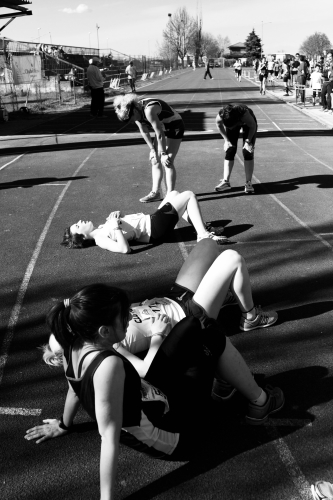 Climate change news can be dismal, as a recent NPR article on David Wallace-Wells’ book the Uninhabitable Earth makes clear. The sheer negativity turns the sustainability challenges we face into a frought subject, which can in turn gum up the gears of progress. But you can find a model for a different way to think about the issue, and it happens to be at the gym. (Hint: It’s not about fitting into your summer bathing suit.)
Climate change news can be dismal, as a recent NPR article on David Wallace-Wells’ book the Uninhabitable Earth makes clear. The sheer negativity turns the sustainability challenges we face into a frought subject, which can in turn gum up the gears of progress. But you can find a model for a different way to think about the issue, and it happens to be at the gym. (Hint: It’s not about fitting into your summer bathing suit.)
In A Pinch, We’re A Bit Of A Bust
Let’s start with some truth. Human beings on the whole are bad at dealing with long term problems. Like, really bad. Psychologists have been exploring this phenomenon for quite a while now and have established that essentially, homo sapiens have two competing brain systems. One of them drives decision making through the lense of emotions, particularly fear and anger, and seeks an immediate solution to whatever the current situation is. The other is analytical and attempts to get us to set aside instant gratification and to think about potential future outcomes. Which one do you think we are better at following? If you would pick “impulsive automaton” from a list of adjectives that best describes the human condition, the research would seem to support your position.1
The reason this is especially worrisome when it comes to climate change is baked into the nature of the problem. The future consequences of a warming planet can feel like a big, abstract, distant problem that is hard to relate to while the things that we need to think differently about are immediate and personal. Changing fuel standards or making it more expensive to drive a car ($18 tolls anyone?) feels like highway robbery right in the here and now, and we get angry about it. Soda taxes or other methods aimed at changing dietary behaviors (which have a direct affect on climate, by the way) feel like the government treating us like children. Outrage! The idea that we may have to drastically change the whole systems that we take for granted in order to accomodate an ever more strained biosphere can spark a gut reaction of denial—we each hope to preserve the life and world that we are comfortable with. It’s all very natural, but not very helpful.
Envision The Future You Want
We do have some tricks for getting around this little problem though, and one place they can be learned on a very personal level is through fitness. Consider working out. The goal is to get stronger, feel better, look better, move better, have a healthier future. But none of it happens overnight. It takes an investment of time and energy, over weeks, months, and even years in order to get to the objective, and it is certainly not easy. We can easily become demotivated because our instant gratification centers would rather stay in bed, stay on the couch, or give up all together. Nutrition can be even worse. Having a good diet requires the even more difficult skill of impulse control. We’ve got to keep our immediate inner desires in check—give me that chocolate cake!—and we all know what a bear it can be.
And yet, we can and do succeed. How?
The trick is to change the focus. What often moves people forward in health and wellness is learning to emphasize not what one is or is not, or what one has to give up or change, but rather the vision of what one could become. It is the possibilities that the most are powerful motivators. Think about it, why do people go to the gym early in the morning or late at night? Why do they resist that tasty dessert or that extra drink? It’s because they feel that what they can become is worth more than the instant gratification of staying in bed or having the treat. This is one way to think about climate change, too. Instead of getting hung up on challenges, we should all focus on a future to get excited about. What do we hope the world will look like fifty years from now, and what about that vision is exciting? What is it then that we need to do to get there? These are the roadmaps that can lead to change. It doesn’t make understanding the downsides of inaction unimportant, but it does make acting against those downsides a lot more palatable.


